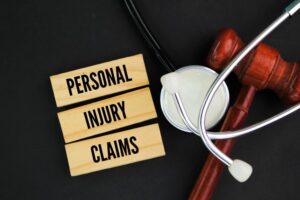A personal injury can result in incredibly difficult physical and emotional injuries. You may have broken bones, whiplash, internal injuries, head trauma, and much more.
Most people know they can receive compensation for medical bills if another person injures them. However, they may not know about the possibility of receiving compensation for pain and suffering.
An experienced Red Lodge, MT personal injury attorney can review your claim today to determine if you can obtain compensation for pain and suffering, as well as for medical bills and lost income. Personal injury attorneys operate on a contingency basis. So, they are only paid if your case is successful.
SCHEDULE FOR A FREE CASE EVALUATION

A personal injury claim is a legal process through which an individual seeks compensation for injuries or damages caused by another party’s negligence, recklessness, or intentional actions. These claims typically arise when someone suffers physical, emotional, or financial harm due to incidents like car accidents, slip-and-falls, medical malpractice, or defective products. The goal is to hold the responsible party accountable and secure financial recovery for medical expenses, lost income, pain and suffering, and other losses.
The process begins with filing a claim, usually against the at-fault party’s insurance company or, in some cases, directly against the individual or entity responsible. The claimant must provide evidence, such as medical records, witness statements, or accident reports, to support their case. Many claims are settled out of court through negotiations, where both parties agree on compensation. However, if a fair settlement cannot be reached, the case may proceed to trial, where a judge or jury determines the outcome.
Personal injury claims are subject to specific legal rules that vary by jurisdiction. For example, statutes of limitations set deadlines for filing claims, typically ranging from one to three years from the date of the injury. Consulting with a personal injury lawyer is usually recommended to navigate these complexities, assess the claim’s value, and maximize the chances of a favorable outcome. While most claims are resolved without litigation, the process can still be time-consuming, requiring patience and thorough documentation.

Pain and suffering is a term used in personal injury law to describe the non-economic damages that a person may be entitled to receive as a result of their injuries. While economic damages, such as medical expenses and lost wages, can be easily quantified, pain and suffering is more subjective and is meant to compensate the injured person for the physical and emotional toll their injuries have taken on their life.
Understanding pain and suffering is easier by reviewing hypothetical accident scenarios:
Following a severe car accident, Jane suffered a herniated disc in her lower back, resulting in chronic pain that radiates down her legs. She describes the pain as a constant burning sensation, making it difficult to sit, stand, or walk for extended periods.
Despite physical therapy and pain medications, Jane experiences flare-ups that disrupt her sleep and prevent her from engaging in activities she once enjoyed, such as hiking or playing with her children. The persistent discomfort has forced her to reduce her work hours, impacting her financial stability and causing her to feel a loss of independence and self-worth.
John slipped on a wet floor in a grocery store, fracturing his wrist and sustaining a concussion. Beyond the physical pain of his injuries, John has developed significant emotional distress. He experiences frequent anxiety about falling again, which has led him to avoid public places and social gatherings.
The concussion has also caused persistent headaches and difficulty concentrating, making it challenging for him to perform his job as an accountant. John feels isolated and frustrated, as his injuries have strained his relationships with family and friends, leaving him with a sense of hopelessness about his recovery.
Cindy was attacked by a neighbor’s dog while jogging, resulting in deep lacerations to her arm and leg. In addition to the physical pain and scarring, Maria now suffers from post-traumatic stress disorder (PTSD). She experiences nightmares and flashbacks of the attack and the sound of barking triggers intense panic attacks.
Cindy, once an avid runner, no longer feels safe exercising outdoors, which has impacted her physical health and mental well-being. Her fear of dogs has also made it difficult to visit friends or family with pets, causing her to withdraw socially and feel a profound loss of her former lifestyle.
Bill, a construction worker, suffered a traumatic brain injury after falling from scaffolding at a job site. The injury has caused chronic migraines, dizziness, and memory issues, preventing him from returning to work.
Bill, who once prided himself on his physical strength and ability to provide for his family, now struggles with feelings of inadequacy and depression. He can no longer participate in his favorite hobbies, such as playing soccer or coaching his son’s team, leading to a significant loss of enjoyment of life. The emotional toll of his diminished quality of life has compounded the physical pain he endures daily.
These are hypothetical examples, but they illustrate how much mental and physical pain and suffering can affect your life after an accident. Speak to a personal injury lawyer in your area if you think another party caused your pain and suffering.
When pursuing a personal injury claim, you may be eligible to receive several types of compensable damages. These can include:
Economic damages are the measurable financial losses you have suffered due to your injuries. It can include:
Non-economic damages are the intangible losses you have suffered due to your injuries. It can include:

Personal injury claims can arise from a wide range of accidents and incidents because of the negligent actions of another person or entity. Some common causes of personal injury claims include:
It’s important to consult with a personal injury lawyer to determine if you have a valid claim based on the specific circumstances of your case. You can have a viable claim even when you think you do not. So, always speak to a personal injury lawyer after any accident or incident with an injury where another party might be responsible.

If you’re seeking compensation for pain and suffering in a personal injury claim, you need an experienced attorney to maximize your potential recovery. Here are some ways that an attorney can help:
An attorney will thoroughly investigate your case, gather evidence, and interview witnesses to build a compelling case on your behalf. They will ensure that all necessary documentation is collected, such as medical records, police reports, and photographs of the accident scene. This evidence will be essential in proving the extent of your injuries and their impact on your life.
Determining the value of pain and suffering damages can require a good personal injury lawyer.
An experienced attorney will have the knowledge and experience to accurately assess the value of your pain and suffering based on the severity of your injuries, the duration of your recovery, the impact on your daily life, and similar cases in your jurisdiction.
They will recover fair and just compensation for your pain and suffering.
Insurance companies are notorious for trying to settle personal injury claims for the lowest possible amount. An attorney will skillfully negotiate with the insurance company to ensure you are not taken advantage of. They will fight for the full and fair compensation you deserve for your pain and suffering.
If your case cannot be resolved through negotiation, an attorney will be prepared to take your case to trial. They will present your case to a judge or jury, skillfully arguing for the maximum compensation for your pain and suffering. Having an experienced trial attorney on your side can significantly increase your chances of a successful outcome.
The value of a personal injury claim, including pain and suffering damages, can vary significantly depending on the case’s specific circumstances.
Factors that can influence the value of a personal injury claim include:
Furthermore, your case can rise dramatically in value if you have serious pain and suffering. For example, a severe car crash can shatter several bones in your legs. The pain may be excruciating. Your personal injury lawyer will communicate with your doctors to document the severity of your mental and physical suffering.
It’s important to consult with a personal injury attorney to get a more accurate assessment of the potential value of your claim based on the specific details of your case.
Pain and suffering can have a significant impact on your life following a car crash, slip and fall, medical mistake, etc. It’s essential to understand that you may be entitled to compensation for the physical and emotional toll that your injuries have taken on you.
By seeking the help of a personal injury attorney, you can handle the complexities of your case and fight for the compensation you deserve.
Don’t suffer in silence; contact a car accident attorney near you to discuss your options and seek justice for your pain and suffering.